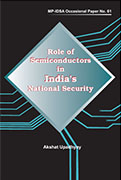Role of Semiconductors in India’s National Security
- 2022 |
- Occasional Papers
The Indian government has rightly given a clarion call for India to be a Chip Maker rather than a Chip Taker. The requirement of semiconductors in India’s national security domain has become critical since they form the substrate of every important activity in the country – from the economic to the military domain. Technologies such as artificial intelligence (AI), quantum computing, blockchain and big data analytics are made possible only due to the availability of advanced semiconductor chips. The world’s move towards mitigating the effects of climate change through the use of green technology is also heavily dependent on the continued availability of specialised chips. However, the manufacturing of these chips is a complex process and only a handful of countries dominate the entire supply chain which is extremely vulnerable and sensitive to changes. These reasons have made semiconductors one of the most vaunted products in human history and countries around the world have resorted to export controls and outright bans against the sale and transfer of this product and related technologies. In this scenario, it is imperative for India to chalk out a path for self-reliance using indigenous talent and expertise as well as become part of resilient supply chains from trusted geographies.
About the Author
Lt Col Akshat Upadhyay is a Research Fellow in the Strategic Technologies Centre at Manohar Parrikar Institute for Defence Studies and Analyses (MP-IDSA). He has a Bachelors in Electronics and Telecommunication, Masters in History as well as Political Science and an MPhil in Defence and Strategic Studies. The author is a prolific writer and has contributed to several publications including MP-IDSA’s Journal of Defence Studies (JDS) and Strategic Analysis, The Tribune, Hindustan Times, Times of India, Daily Guardian, Indian Aerospace and Defence Bulletin, Financial Express, The Hindu, Pragati magazine, Indian Military Review (IMR) and South Asia Security Trends. He has written for think tanks such as the Centre for Land Warfare Studies (CLAWS) and Observer Research Foundation (ORF). He has also authored a book on India’s Coercive Diplomacy against Pakistan (KW Publishers). At MP-IDSA, he is researching disruptive technologies, non-contact warfare and semiconductors.
Keywords: Cyber Security





